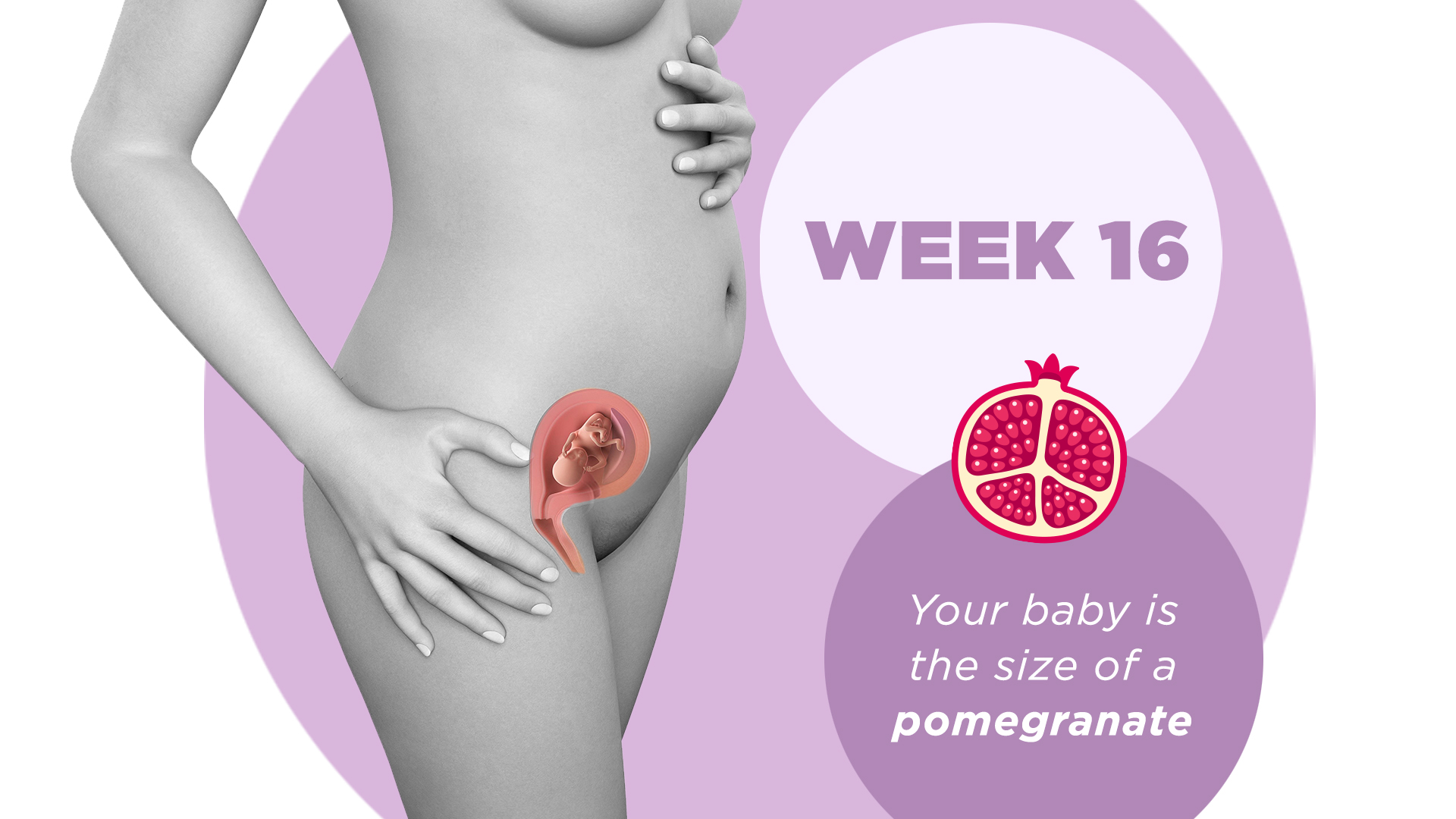16 weeks pregnant - symptoms, fetal development and what to consider
Including your baby's development...

In your 16th week of pregnancy you have lots to think about, so to make sure your mind is at ease, that everything you're going through is normal, we've put together this guide. Scroll down for all the info you need on the symptoms you might be experiencing, as well as your baby's development...
Symptoms at 16 weeks pregnant
Your uterus has now grown considerably and weighs about 250 grams. You may be experiencing those pregnancy hot flushes in more ways than one. If the first trimester left you too sick and tired to raise a smile, let alone muster the energy for some fun between the sheets, then the second trimester may well make up for it. Pregnant women often find that the middle months of pregnancy are ones during which their sex drive goes into overdrive.
However, while an increased libido is often one of the plus sides of pregnancy, changes in blood flow and metabolism can also leave you feeling hot and bothered. Sudden hot flushes and excessive sweating can both become are par for the course.
Carrying around extra weight in pregnancy can lead to a lowering of your foot arches and an increase in shoe size. Doctors at the University of Iowa have found the arch of the foot falls between two and ten millimetres during a first pregnancy. And, it doesn't return to normal...
Fetal development at 16 weeks pregnant
Your baby is around 11.6cm long and weighs around 135g. In the next few weeks they'll go through a tremendous growth spurt, doubling their weight and putting on centimetres in length.
Your baby's hearing is one of the first senses to develop in the womb. From this week onwards they'll start to be able to hear your voice and other sounds from outside the womb - albeit a bit muffled and muted. It was thought that babies couldn't hear until the ear was structurally complete at around 24 weeks, but a Belfast study of over 400 babies at just 16 weeks, saw clear responses via ultrasound when researchers beamed in a pure pulse of sound.
Your baby's head will develop further and their ears and eyes will move into the position they will be in when they are born.
Parenting advice, hot topics, best buys and family finance tips delivered straight to your inbox.

The changes you should make at 16 weeks pregnant
You'll now have your 16 week antenatal appointment. At every check expect to provide a urine sample, which will be tested for sugar and protein. Your midwife will take your blood pressure and feel your abdomen to check the height of your uterus which tells her how your baby is growing. Routine checks are the only way of keeping an eye on how you and your baby are doing. They're also an opportunity to discuss with your midwife any concerns you have, from healthy eating in pregnancy to the birth itself.
At this 16-week appointment your midwife may review and discuss the results of any screening tests you have had, as well as giving you specific information about the anomaly scan that will be offered around 20 weeks.
She may recommend iron supplements if your haemoglobin levels are low. If you are expecting twins and an earlier scan identified them as sharing a placenta (monochorionic) then it's recommended that you are scanned every two weeks throughout your pregnancy. Where unborn identical twins have different sacs in the womb but share the same placenta they can suffer from a rare but serious condition known as twin-to-twin transfusion syndrome which requires careful monitoring.
Monochorionic twins will have an antenatal appointment and a growth scan this week. Twins who do not share a placenta (dichorionic) will not have the growth scan but will have an routine antenatal appointment.
You could have the Quadruple Test this week and some women will have an amniocentesis this week, too. When you've got a diary full of antenatal appointments and a head full of information, then small matters like a trip to the dentist may not be top of your to-do-list. However, scientists have found a link between gum disease and premature delivery so it's worth paying particularly attention to your dental hygiene and health. And it's free! If you aren't registered with a dentist then you can find an NHS dentist locally by going to nhs.uk.
Even if you don't fancy enrolling in an exercise class then do make time for your pelvic floor exercises. Your pelvic floor is made up of layers of muscles that stretch from your pubic bone to the base of your spine. These muscles come under considerable strain during pregnancy and child birth and can lead to incontinence issues. Talk to your midwife about pelvic floor exercises.
Further advice and information:
- Visit the NHS for more pregnancy week by week advice
- Download a pregnancy tracker app
- View all our pregnancy week by week guides
Anna Bailey has been the editor of GoodtoKnow since 2018. Before joining the team she was Features Editor at MSN UK, where she oversaw Family Health and Days Out. Previously, she was Digital Lifestyle Editor for the broadcaster UKTV, and Lifestyle Editor for ITV.com. Anna studied Multi-Media Journalism at Bournemouth University and went on to gain her NCTJ and NCE journalism qualifications. Anna is responsible for driving the direction and editorial strategy of Goodto. A mum and experienced baby product tester, she is passionate about providing safe, trustworthy, and relatable advice for families of all kinds.